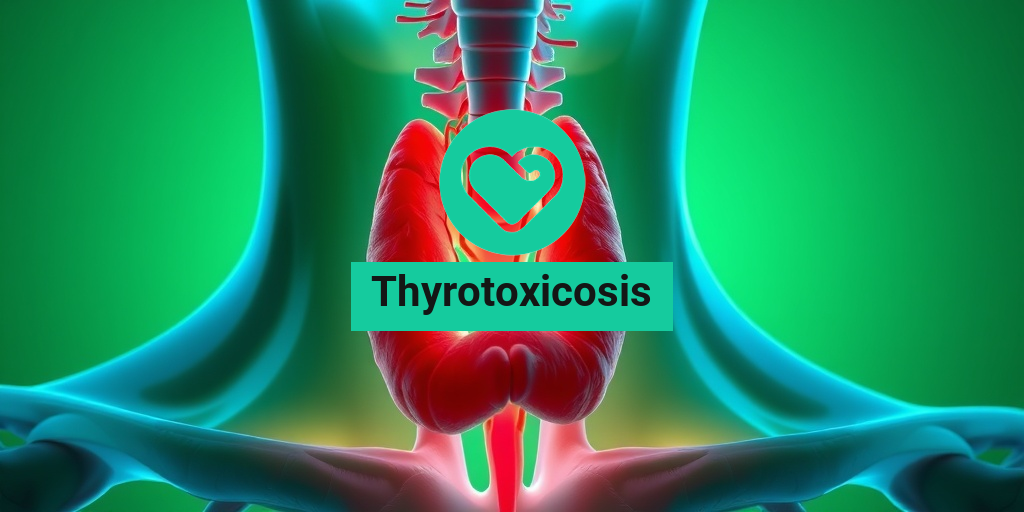What Is Thyrotoxicosis?
Thyrotoxicosis is a medical condition characterized by an excess of thyroid hormones in the body. This condition can lead to a range of metabolic disturbances and can significantly impact various bodily functions. The thyroid gland, located in the neck, produces hormones that regulate metabolism, energy levels, and overall growth and development. When the production of these hormones becomes excessive, it results in thyrotoxicosis.
Understanding Thyrotoxicosis vs Hyperthyroidism
It’s important to note that thyrotoxicosis and hyperthyroidism are often used interchangeably, but they are not the same. Hyperthyroidism refers specifically to the overactivity of the thyroid gland, leading to increased hormone production. In contrast, thyrotoxicosis encompasses any condition that results in elevated thyroid hormone levels, including those caused by external factors such as medication or inflammation of the thyroid gland.
Causes of Thyrotoxicosis
There are several potential causes of thyrotoxicosis, including:
- Graves’ Disease: An autoimmune disorder that stimulates the thyroid gland to produce excess hormones.
- Thyroiditis: Inflammation of the thyroid gland, which can lead to the release of stored hormones.
- Thyrotoxicosis Factitia: This occurs when individuals take thyroid hormones without medical supervision, often leading to an overdose.
- Excessive Iodine Intake: Consuming too much iodine, either through diet or supplements, can trigger increased hormone production.
Understanding the underlying cause of thyrotoxicosis is crucial for effective management and treatment. If you suspect you may be experiencing symptoms, consulting a healthcare professional is essential.
Thyrotoxicosis Symptoms
The symptoms of thyrotoxicosis can vary widely among individuals, but they often include a combination of physical and psychological manifestations. Recognizing these symptoms early can lead to timely intervention and management.
Common Physical Symptoms
Individuals with thyrotoxicosis may experience:
- Increased Heart Rate: Palpitations or a racing heart are common due to heightened metabolic activity.
- Weight Loss: Despite an increased appetite, many people lose weight due to accelerated metabolism.
- Heat Intolerance: Affected individuals often feel excessively warm and may sweat more than usual.
- Tremors: Fine shaking of the hands or fingers can occur.
- Fatigue: Despite feeling energetic, many report a sense of fatigue or muscle weakness.
Psychological Symptoms
Thyrotoxicosis can also affect mental health, leading to symptoms such as:
- Anxiety: Increased nervousness or anxiety levels are common.
- Restlessness: Difficulty sitting still or concentrating may occur.
- Sleep Disturbances: Insomnia or disrupted sleep patterns can be prevalent.
Thyrotoxicosis in Pregnancy
Pregnant women can also experience thyrotoxicosis, which may pose risks to both the mother and the developing fetus. Symptoms may be similar to those experienced outside of pregnancy, but they can complicate the pregnancy and require careful management. If you are pregnant and suspect you may have thyrotoxicosis, it is vital to seek medical advice promptly.
In conclusion, understanding thyrotoxicosis and its symptoms is essential for early diagnosis and effective management. If you or someone you know is experiencing these symptoms, consider reaching out to a healthcare provider for a thorough evaluation. For more information and evidence-based health answers, visit Yesil Health AI. Your health matters, and staying informed is the first step towards better well-being! 🌟

Causes of Thyrotoxicosis
Thyrotoxicosis is a condition characterized by an excess of thyroid hormones in the body, leading to a range of symptoms that can significantly impact a person’s health and well-being. Understanding the causes of thyrotoxicosis is crucial for effective management and treatment. Here are some of the primary causes:
1. Graves’ Disease
Graves’ disease is the most common cause of thyrotoxicosis. It is an autoimmune disorder where the immune system mistakenly attacks the thyroid gland, causing it to produce excessive amounts of thyroid hormones. This condition often leads to symptoms such as weight loss, rapid heartbeat, and anxiety. 🦋
2. Toxic Nodular Goiter
A toxic nodular goiter, also known as toxic adenoma, occurs when one or more nodules in the thyroid gland become overactive and produce excess hormones. This condition can develop over time and may not present noticeable symptoms until it becomes severe.
3. Thyroiditis
Thyroiditis refers to inflammation of the thyroid gland, which can lead to the release of stored thyroid hormones into the bloodstream. There are various types of thyroiditis, including:
- Subacute thyroiditis: Often follows a viral infection and can cause temporary thyrotoxicosis.
- Painless thyroiditis: A silent inflammation that can lead to transient thyrotoxicosis.
4. Excessive Iodine Intake
Excessive iodine intake can also lead to thyrotoxicosis, particularly in individuals with pre-existing thyroid conditions. This can occur through dietary sources, supplements, or medications containing iodine. It’s essential to monitor iodine intake, especially for those at risk. 🥗
5. Thyrotoxicosis Factitia
Thyrotoxicosis factitia is a rare form of thyrotoxicosis caused by the ingestion of thyroid hormones, often as a result of self-medication. This condition highlights the importance of using thyroid medications only under medical supervision.
6. Thyroid Cancer
In rare cases, certain types of thyroid cancer can lead to thyrotoxicosis. This occurs when cancerous cells produce thyroid hormones, contributing to an excess in the bloodstream.
Risk Factors for Thyrotoxicosis
Identifying the risk factors for thyrotoxicosis can help in early detection and prevention. Here are some key risk factors to consider:
1. Gender
Women are significantly more likely than men to develop thyrotoxicosis, particularly due to conditions like Graves’ disease. The hormonal differences between genders may play a role in this increased risk. 👩⚕️
2. Age
Thyrotoxicosis can occur at any age, but it is most commonly diagnosed in individuals between the ages of 30 and 50. Early detection is crucial for effective management.
3. Family History
A family history of thyroid disorders can increase the risk of developing thyrotoxicosis. If you have relatives with conditions like Graves’ disease or Hashimoto’s thyroiditis, it’s essential to monitor your thyroid health closely.
4. Autoimmune Disorders
Individuals with other autoimmune disorders, such as rheumatoid arthritis or type 1 diabetes, may have a higher risk of developing thyrotoxicosis. The presence of one autoimmune condition can predispose individuals to others.
5. Stress
High levels of stress can exacerbate thyroid conditions and may trigger episodes of thyrotoxicosis in susceptible individuals. Managing stress through relaxation techniques, exercise, and proper sleep is vital for thyroid health. 🧘♀️
6. Pregnancy
Pregnancy can influence thyroid function, and some women may experience thyrotoxicosis during this time. It’s essential for pregnant women to have their thyroid levels monitored regularly to ensure both maternal and fetal health.
Understanding the causes and risk factors of thyrotoxicosis is essential for early detection and effective management. If you suspect you may be experiencing symptoms related to thyrotoxicosis, consult a healthcare professional for a thorough evaluation and appropriate treatment options. 🩺

Thyrotoxicosis Diagnosis
Diagnosing thyrotoxicosis can be a complex process, as it involves a thorough evaluation of symptoms, medical history, and various diagnostic tests. Understanding the signs and symptoms is crucial for early detection and effective management.
Recognizing Symptoms
Patients with thyrotoxicosis often present with a range of symptoms that can vary in intensity. Common symptoms include:
- Increased heart rate: Palpitations or a racing heart are often reported.
- Weight loss: Unexplained weight loss despite normal or increased appetite.
- Heat intolerance: Increased sensitivity to heat and excessive sweating.
- Nervousness and anxiety: Feelings of restlessness or anxiety can be prevalent.
- Tremors: Fine tremors in the hands or fingers.
- Fatigue: Persistent fatigue or muscle weakness.
- Changes in menstrual patterns: Irregularities in menstrual cycles for women.
Medical History and Physical Examination
A comprehensive medical history is essential in diagnosing thyrotoxicosis. Your healthcare provider will ask about:
- Your symptoms and their duration.
- Any family history of thyroid disorders.
- Previous thyroid issues or treatments.
During the physical examination, the doctor may check for signs such as an enlarged thyroid gland (goiter) or changes in skin texture and hair.
Diagnostic Tests
To confirm a diagnosis of thyrotoxicosis, several tests may be conducted:
- Thyroid function tests: Blood tests measuring levels of thyroid hormones (T3 and T4) and Thyroid-Stimulating Hormone (TSH) are crucial. In thyrotoxicosis, T3 and T4 levels are typically elevated, while TSH levels are low.
- Radioactive iodine uptake test: This test measures how much iodine the thyroid gland absorbs, helping to determine the cause of thyrotoxicosis.
- Thyroid scan: A scan can visualize the thyroid gland and identify any nodules or abnormalities.
In some cases, additional tests may be necessary to rule out other conditions or to assess the severity of the disease.
Thyrotoxicosis Treatment Options
Once diagnosed, managing thyrotoxicosis is essential to alleviate symptoms and prevent complications. Treatment options vary based on the underlying cause, severity of symptoms, and individual patient factors.
Medications
Several medications can effectively manage thyrotoxicosis:
- Antithyroid medications: Drugs like methimazole and propylthiouracil (PTU) inhibit the production of thyroid hormones. These are often the first line of treatment.
- Beta-blockers: Medications such as propranolol can help control symptoms like rapid heart rate and anxiety, providing relief while other treatments take effect.
- Iodine solutions: High doses of iodine can temporarily reduce hormone production and are sometimes used before surgery.
Radioactive Iodine Therapy
Radioactive iodine therapy is a common treatment for hyperthyroidism and thyrotoxicosis. This treatment involves:
- Administering a dose of radioactive iodine, which is absorbed by the thyroid gland.
- Gradually destroying overactive thyroid cells, leading to a reduction in hormone production.
This option is particularly effective for patients with Graves’ disease or toxic nodular goiter.
Surgery
In some cases, surgical intervention may be necessary. Thyroidectomy, the surgical removal of part or all of the thyroid gland, is considered when:
- Medications are ineffective or cause significant side effects.
- The patient has a large goiter causing compressive symptoms.
- There is a suspicion of thyroid cancer.
Managing Thyrotoxicosis in Special Populations
For pregnant women or those planning to conceive, managing thyrotoxicosis requires special consideration. Medications like PTU are often preferred during the first trimester due to their safety profile. Close monitoring is essential to ensure both maternal and fetal health.
In conclusion, early diagnosis and appropriate treatment of thyrotoxicosis are vital for effective management and improved quality of life. If you suspect you have symptoms of thyrotoxicosis, consult a healthcare professional for a thorough evaluation and personalized treatment plan. 🌟

Living with Thyrotoxicosis
Thyrotoxicosis is a condition characterized by an excess of thyroid hormones in the body, leading to a range of symptoms that can significantly impact daily life. Understanding how to manage this condition is crucial for maintaining a good quality of life. Here, we’ll explore practical tips and lifestyle adjustments that can help individuals living with thyrotoxicosis.
Understanding Thyrotoxicosis
Before diving into management strategies, it’s essential to grasp what thyrotoxicosis entails. This condition can arise from various causes, including:
- Graves’ Disease: An autoimmune disorder that stimulates the thyroid gland.
- Thyroiditis: Inflammation of the thyroid gland, which can lead to hormone leakage.
- Thyrotoxicosis Factitia: Caused by excessive intake of thyroid hormones, often through medication.
Symptoms can vary widely but often include weight loss, increased heart rate, anxiety, and heat intolerance. Recognizing these symptoms is the first step toward effective management.
Dietary Considerations
Nutrition plays a vital role in managing thyrotoxicosis. Here are some dietary tips to consider:
- Balanced Diet: Focus on a diet rich in fruits, vegetables, whole grains, and lean proteins. This can help support overall health and well-being.
- Avoid Stimulants: Limit caffeine and other stimulants, as they can exacerbate symptoms like anxiety and increased heart rate.
- Iodine Intake: Monitor your iodine consumption. While iodine is essential for thyroid function, excessive amounts can worsen thyrotoxicosis.
Regular Monitoring and Medication
Regular check-ups with your healthcare provider are crucial for managing thyrotoxicosis effectively. This may include:
- Thyroid Function Tests: Regular blood tests to monitor hormone levels.
- Medication Management: Depending on the cause, medications such as methimazole or beta-blockers may be prescribed to control symptoms.
Adhering to your medication regimen is vital. If you experience side effects or have concerns, discuss them with your doctor rather than discontinuing treatment on your own.
Stress Management Techniques
Living with thyrotoxicosis can be stressful, and managing stress is essential for overall health. Consider incorporating the following techniques into your routine:
- Mindfulness and Meditation: Practices like yoga and meditation can help reduce stress and improve mental clarity.
- Regular Exercise: Engaging in moderate physical activity can boost your mood and energy levels.
- Support Groups: Connecting with others who understand your experience can provide emotional support and practical advice.
Thyrotoxicosis Complications
While managing thyrotoxicosis is essential, it’s equally important to be aware of potential complications that can arise from this condition. Understanding these risks can help you take proactive steps to mitigate them.
Cardiovascular Issues
One of the most significant complications of thyrotoxicosis is its impact on the cardiovascular system. The excess thyroid hormones can lead to:
- Increased Heart Rate: This can result in palpitations and, in severe cases, arrhythmias.
- High Blood Pressure: Thyrotoxicosis can cause hypertension, increasing the risk of heart disease.
Regular monitoring of heart health is crucial, especially if you have a history of cardiovascular issues.
Bone Health
Long-term thyrotoxicosis can also affect bone density, leading to conditions such as osteoporosis. Here’s how to protect your bone health:
- Calcium and Vitamin D: Ensure adequate intake of calcium and vitamin D to support bone strength.
- Weight-Bearing Exercises: Engage in activities that promote bone health, such as walking or resistance training.
Thyroid Storm
In rare cases, untreated thyrotoxicosis can lead to a life-threatening condition known as thyroid storm. Symptoms include:
- High Fever: A sudden spike in body temperature.
- Severe Tachycardia: Extremely rapid heart rate.
- Confusion or Agitation: Changes in mental status.
If you experience these symptoms, seek emergency medical attention immediately. Early intervention is critical in preventing serious outcomes.
Living with thyrotoxicosis requires a comprehensive approach that includes lifestyle adjustments, regular monitoring, and awareness of potential complications. By taking proactive steps, individuals can manage their condition effectively and maintain a fulfilling life. 🌟

Frequently Asked Questions about Thyrotoxicosis
What is Thyrotoxicosis?
Thyrotoxicosis refers to a condition resulting from excessive levels of thyroid hormones in the body. This can lead to a variety of symptoms, including weight loss, increased heart rate, and anxiety. It is important to differentiate it from hyperthyroidism, which is a specific cause of thyrotoxicosis.
How does Thyrotoxicosis differ from Hyperthyroidism?
While thyrotoxicosis is a general term for elevated thyroid hormones, hyperthyroidism specifically refers to the overproduction of these hormones by the thyroid gland. In other words, all cases of hyperthyroidism can cause thyrotoxicosis, but not all thyrotoxicosis is due to hyperthyroidism.
What are the common causes of Thyrotoxicosis?
- Graves’ disease
- Thyroiditis
- Excessive intake of thyroid hormone medications
- Thyroid nodules producing excess hormones
What is Thyrotoxicosis Factitia?
Thyrotoxicosis factitia is a form of thyrotoxicosis caused by the ingestion of excessive amounts of thyroid hormone, often due to self-medication. It is crucial to recognize this condition to avoid unnecessary treatments.
Can Thyrotoxicosis occur during pregnancy?
Yes, thyrotoxicosis in pregnancy can occur and may pose risks to both the mother and the fetus. It is essential for pregnant women to receive appropriate monitoring and management to ensure a healthy pregnancy.
What are the symptoms of Thyrotoxicosis?
- Rapid heartbeat
- Weight loss
- Increased appetite
- Heat intolerance
- Nervousness or anxiety
How is Thyrotoxicosis diagnosed?
Diagnosis typically involves a combination of clinical evaluation, blood tests to measure thyroid hormone levels, and sometimes imaging studies to assess the thyroid gland’s structure and function.
What are the treatment options for Thyrotoxicosis?
Treatment for thyrotoxicosis may include:
- Antithyroid medications
- Radioactive iodine therapy
- Surgery in certain cases
What should I do if I experience symptoms of Thyrotoxicosis?
If you suspect you have symptoms of thyrotoxicosis, it is important to consult a healthcare professional for an accurate diagnosis and appropriate management. Early intervention can help prevent complications.
Is there a risk of Thyroid Storm with Thyrotoxicosis?
Yes, thyroid storm is a rare but life-threatening condition that can occur in individuals with untreated or poorly managed thyrotoxicosis. It is characterized by a sudden and severe increase in symptoms and requires immediate medical attention.
How can I manage Thyrotoxicosis effectively?
Effective management of thyrotoxicosis involves regular monitoring of thyroid hormone levels, adherence to prescribed treatments, and lifestyle modifications such as stress management and a balanced diet. Always follow your healthcare provider’s recommendations for the best outcomes.




